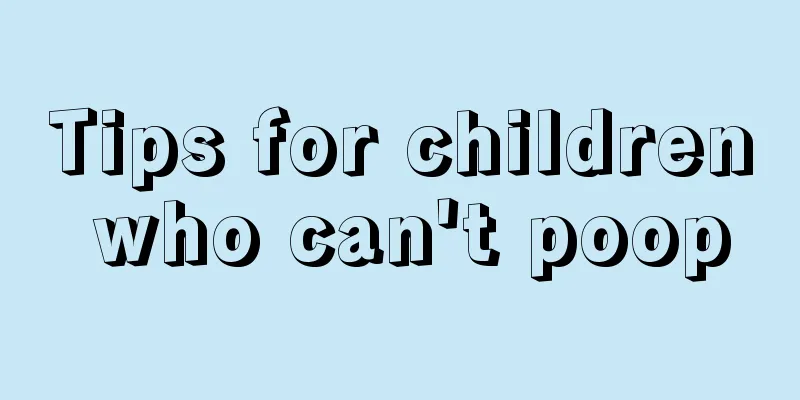How to care for a newborn baby with a blocked nose

|
Newborn babies have blocked noses, and many mothers are particularly nervous, because the blocked noses of newborn babies will seriously affect the physical health of newborn babies, so many mothers want to know how to care for them. The following content will introduce in detail what the care methods are. For many mothers of newborn babies, they can have a comprehensive understanding of the care methods. The nasal cavity of a newborn is not yet fully developed. The nasal cavity is short and small, the nasal passages are narrow, and the nasal mucosa is rich in blood vessels. Therefore, inflammation is likely to occur when stimulated by the external environment or invaded by pathogens. Once the nasal cavity of a newborn becomes inflamed, it will cause nasal congestion. Because at this time the secretions in the nasal cavity will increase, the nasal mucosa will become congested and swollen, causing the originally narrow nasal cavity to become even narrower and causing nasal congestion. When a newborn's nose is blocked, it often manifests as inability to feed well, crying, irritability, difficulty breathing, and sometimes even breathing through the mouth. At this time, the mother can drop a drop of breast milk into the newborn's nasal cavity to soften the nasal secretions, and then use cotton thread or other objects to stimulate the nasal cavity to make the newborn sneeze, and the secretions will be sprayed out; or use a clean sterilized cotton swab dipped in a small amount of water, gently insert it into the nasal cavity, first soften the secretions, and then wipe out the secretions. Be careful to be gentle and do not use excessive force to damage the newborn's delicate nasal mucosa, causing nose bleeding and unnecessary harm. If there is no secretion in the newborn's nasal cavity but the nose is still stuffy, this may be caused by inflammation that causes congestion and swelling of the nasal mucosa. In this case, the mother can apply a warm towel to the base of the newborn's nose, which can also play a certain ventilation role. Usually, you should pay attention to caring for your baby's nasal cavity. When a newborn's nose is blocked, you can hold the baby's head, use a cotton swab dipped in warm water, and gently remove the secretions. Be gentle to prevent damage to the mucosa and cause bleeding. You can also use one or two drops of breast milk or warm water to apply to the nasal cavity. When the secretions soften, you can use cotton thread to gently stimulate the nasal cavity and let the baby sneeze to expel the dirt. When it is cold in winter and you use electric heater to keep warm, be careful of air that is too hot and too dry. It will make the baby's nose uncomfortable. You can hang two freshly washed clothes or wet towels in the room to dry them, so the air will not be too dry. Avoid air that is too dry. To treat nasal congestion, you can also use some drugs that promote nasal mucosal vasoconstriction, but this must be used under the guidance of a doctor, and the number of uses and dosage should be strictly controlled. For newborns, if it is really necessary to use it, it can only be dripped 1-2 times a day at most, because long-term use of the drug can cause dependence and cause drug-induced rhinitis. Many mothers have learned some care methods for newborn babies' stuffy noses through the above answers. After learning the care methods, when their children have stuffy noses, in order not to affect their children's breathing and health, they must use the care methods introduced above as soon as possible to relieve their children's symptoms of stuffy noses as soon as possible. |
<<: Symptoms of runny nose in babies
>>: What to do if your child has a stuffy nose
Recommend
What to do if your child has underarm odor
When children reach puberty, it is found that the...
Clinical manifestations of cerebral palsy in children
Cerebral palsy in children is commonly known as c...
How to treat congenital heart disease in children
If a child has congenital heart disease, the fami...
What is Marfan syndrome in children?
Marfan syndrome is a genetic disease that causes ...
What to do if the baby suddenly cries while sleeping at night
There are many reasons why babies suddenly cry at...
What are the symptoms of pulmonary hypertension in infants?
Many infants will develop a more serious disease,...
The reason why the baby has a fever and white tongue coating
Since babies are just born, they are underdevelop...
Why does my baby suddenly not like to drink milk powder?
If the baby suddenly doesn't like to drink mi...
How do children show signs of autism?
Autism is a relatively common disease. Once a chi...
Is a hand, foot and mouth shot useful?
The probability of hand, foot and mouth disease i...
What are the antidiarrheal medicines for children?
The physical qualities of children in their early...
What will a five month old baby do?
It is difficult for every baby who has just come ...
What should I do if my child has onychomycosis?
Some children often tell their parents that their...
Is it normal for newborn babies to have peeling skin on their hands?
When it comes to the treatment of neonatal diseas...
What medicine is good for whooping cough in children?
Coughing is a normal reaction of our body, but fr...









